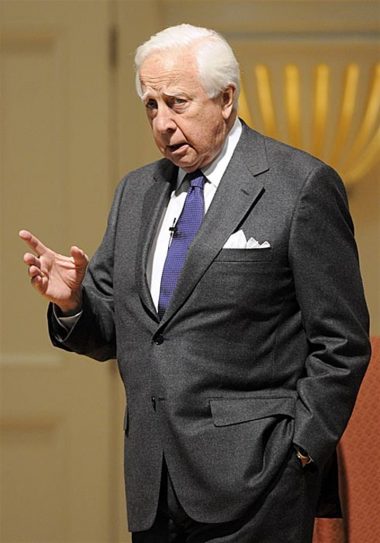David McCullough, a two-time Pulitzer Prize and National Book Award winner, encouraged students, faculty and university guests at Fall Convocation on Oct. 23 to be avid readers and to seek from American history that courage and wisdom of their ancestors to overcome problems faced today.

“History is not about dates,” McCullough said. “History is about ideas, and about human nature, and why we behave the way we do in the best and the worst of times.” And he cautioned the audience not to confuse information with education.
“If information were learning, if you memorized the world almanac, you’d be educated. If you memorized the world almanac, you wouldn’t be educated! You’d be weird!”
A Pittsburgh native, McCullough highlighted three teachers of consequence, including Harry Truman’s history teacher, a Harvard professor who challenged his students to “look at your fish,” and an author with the wisdom to write books that he would want to read himself.
Truman never earned a college degree despite a lifelong love of learning spurred by his teacher in Missouri around the turn of the 20th century. In fact, McCullough said, Truman enjoyed reading Latin for fun – and his public school education is better than an education from many colleges a century later.
The Harvard professor, Louis Agassiz, was an esteemed 19th century scientist. To evaluate potential students, McCullough said, Agassiz would have them stare for hours at a dead fish he presented during their introductory meeting.
The lesson? “It’s not just what you find,” McCullough said, “it’s how you look at what you find.”
And the writer and playwright that McCullough got to know while studying at Yale was Thornton Wilder, himself a winner of the Pulitzer Prize. Wilder taught McCullough to write books on topics that he himself would want to read. That tip led McCullough to the topic of his first book and, eventually, to a distinguished career as an author.
“I wrote the book that I would want to read,” he said.
McCullough was last at Elon just days after the terrorist attacks of Sept. 11, 2001, serving as the inaugural Baird lecturer. Since then, guests have included George Will, Thomas Friedman, and Anna Quindlen, among others.
The author and historian first rose to prominence in 1968 with his first book, The Johnstown Flood, which tells the story of one of the worst natural disasters in United States history. That was followed by The Great Bridge, The Path Between the Seas, Mornings on Horseback, Brave Companions, Truman, John Adams and 1776.
His most recent book, 1776, is a number one New York Times bestseller, and John Adams was broadcast this year as a seven-part miniseries on HBO.
McCullough’s two Pulitzer honors were for John Adams and Truman.
“I’m often asked at the start of a project, ‘What’s your theme?’” McCullough said. “And I have no idea what my theme is. That’s why I’m writing the book!”


